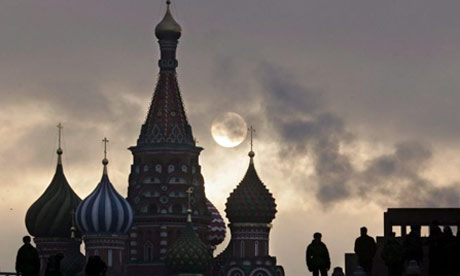The Russian government is looking to create a Cyrillic internet, but is it just another case of Big Brother controlling its citizens?

The growing cold war with Russia has a new front besides oil fields and undersea territorial claims: the internet. Russia's government is pushing for greater control over the Russian-language part of the net - and its aim seems to be to create a web that operates in Cyrillic, completely independent from the wider web.
The problem for Russia is that its top-level domain - with the ASCII suffix .ru - translates into Cyrillic as .py, the domain name of Paraguay. That could pose security problems for Russian users. Kim Davies, who controls the domain names at the international domain naming agency Icann told the Guardian: "Russia has a second top level domain name of .ru in Ascii code, but is pushing for .rf in Cyrillic."
Wolfgang Kleinwachter, special adviser to the chairman of the Internet Governance Forum, says: "The proposal for 'Russian internet' would look at how they can communicate better inside the country. The internationalised domain name gives them an opportunity to do things which are now being tested in China, where they are currently using Chinese characters for three top-level domains: .net, .com and .cn."
A tale of two servers
The key is whether Russian international domain names would use their own root servers - which decide where to route your internet requests - independent of the existing internet root servers which are mainly based in the US.
Kleinwachter thinks that the worst-case scenario would mean everyone would have to register a domain name using the .rf top level domain in Cyrillic. "Then [Russia] would have their own root and it's much easier to control the top-level domain than hundreds of thousands of secondary level domains."
That would, arguably, mean Russians are safe from Paraguayan phishing - but it would also give the Russian government more control of the net and leave Russian citizens isolated from the international community. Davies explains that Russian Cyrillic keyboards make it difficult for Russian users to search for domain names using the roman letters of Ascii code. Without a bridge to coordinate it with Ascii code, a Russian-language internet would be cut off from the global net.
China's citizens could similarly become isolated from international opinion. "The Chinese have the option now to keep the domain .cn in Ascii code or to cut it." Kleinwachter says. "If they cut it then they have an opportunity to build something like a bridge which would link the Chinese internet to the Ascii internet. The Russians, like the Chinese, discussed this option. My impression is that the Russian Foreign Ministry is much more open to such an option than [China's] Ministry of Economic Development and Trade. Another way would be to give every citizen a fixed IP address, which would go with you wherever you approach the internet."
Setting up a new root server would not be expensive, Davies says, but would cause "technical issues". Guillaume Lovet, head of the threat response team at security company Fortinet, explains: "If it's about re-implementing internet protocols, it would be like installing new, additional firmware on our home router, and new drivers on each network-enabled computer at home. If it's about rebuilding everything from scratch, it is comparable to throwing everything in the bin."
International isolation
Davies says the key downside would be how much the Russians stand to lose out on the global operability of the web unless bridges are built with the Ascii-dominated global internet. "Russians estimate that 90% of the communication will be within Russia and just 10% will go outside," says Kleinwachter. But it's that 10% which would feel the real difference.
Kleinwachter says the speculation is that people will need a password authorised by government agencies to use the global internet. The Kremlin therefore would be able to control what communication the individual is having with the rest of the world. The government says that would help it monitor cybercrime.
Lovet is more sceptical. "Russia has a very strong academic tradition of technical universities, which form very sharp and competent computer scientists. At the same time, the average income per head is extremely low. This combination creates an explosive cocktail. Any attempt to confine Russian hackers inside some kind of Russian cyberspace is bound to fail."
Other security experts go even further. "This will put a wall between cybercriminals and their victims," says Jose Nazario, from Arbor, who works to protect governments and corporations from cyber attacks emanating from Russia. "It makes it very difficult to track Russian cybercrime. Security experts are just starting to get a picture of their methods, and this will slow us down dramatically. It is also an escalation of tension between Putin's Russia and the west."
http://www.guardian.co.uk/technology/2008/jan/03/internet.censorship








